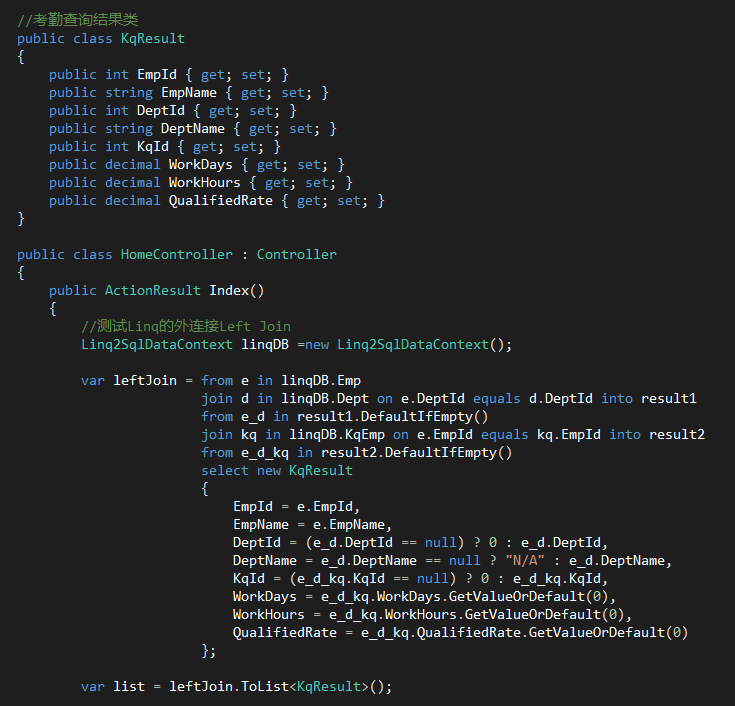Suppose you have a tblRoom and tblUserInfo. Now, you need to select all the rooms regardless of whether the room has user information or not. This calls for a LEFT JOIN which will select everything from the LEFT side (the room side) regardless of the join on the right side. Here is the example.
假如你有两张表tblRoom(房 间表)和tblUserInfo(住户表)。
现在你需要检索出所有房间的信息,而不管这个房间是否有人居住。这就需要进行LEFT JOIN(左外连接),左外连接会检索出LEFT JOIN左边表中的所有行,而不管右边的表是否有匹配项。下面是一个例子:

var list = from r in dc.tblRooms join ui in dc.tblUserInfos on r.UserName equals ui.UserNameinto userrooms from ur in userrooms.DefaultIfEmpty() select new { FirstName = (ur.FirstName == null) ? "N/A" : ur.FirstName, LastName = (ur.LastName == null) ? "N/A" : ur.LastName, RoomName = r.Name };
he anonymous type replaces the "null" FirstName and LastName with "N/A" (not available).
使用"N/A"(不可得)代替 FirstName 和 LastName 值为"null"的情况。
另附:Linq实现多个表 LEFT JOIN 如下
目标SQL语句(多表 LEFT JOIN 查询)

SELECT id, name, jname, cname FROM userinfo u LEFT JOIN job j on u.job = j.jid LEFT JOIN city c on u.city = c.cid
Linq To Sql 实现三个表 LEFT JOIN 如下:

var list = ( from u in dc.userinfos join j in dc.jobs on u.job equals j.jid into j_join from x in j_join.DefaultIfEmpty() join c in dc.cities on u.city equals c.cid into c_join from v in c_join.DefaultIfEmpty() select new { id = u.id, name = u.name, jname = x.jname, cname = v.cname, /*u1=u,x1=x,v1=v*/ //不要用对象的方式 因为对象可能为null那么对象.属性就会抛异常 } ).ToList(); for (var i = 0; i < list.Count(); i++) { Console.WriteLine(list[i].name + ' ' + list[i].jname + ' ' + list[i].cname); //字段为null不报异常 //Console.WriteLine(list[i].u1.name+' '+list[i].x1.jname+' '+list[i].v1.cname+" "); //对象x1 v1 有可能为null 抛异常 } Console.ReadLine();
3个表 LEFT JOIN 例子:
Emp(员工表)、Dept(部门表)、KqEmp(人员考勤信息表)

